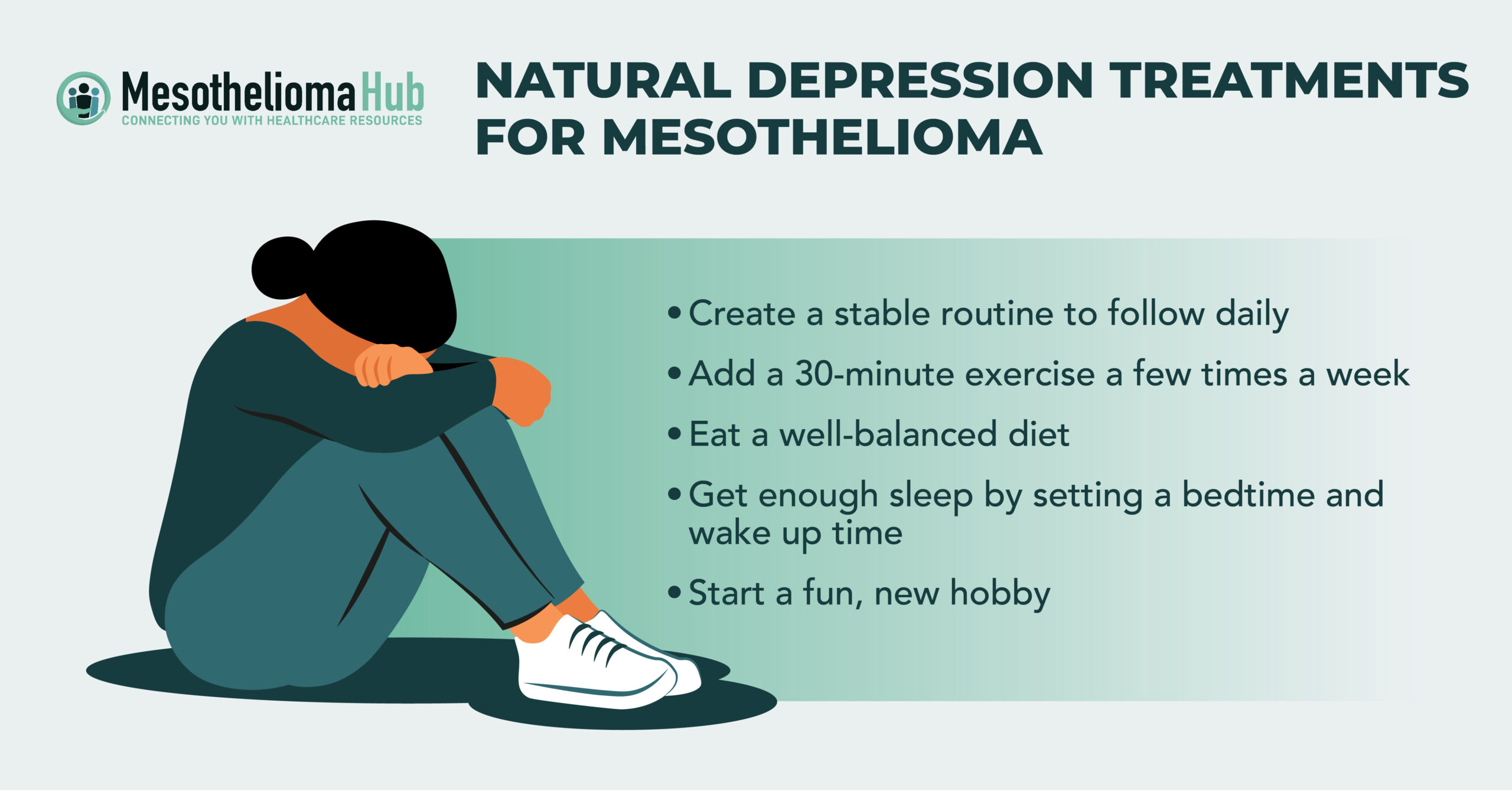Emotional Support / Depression and Mesothelioma
Depression and Mesothelioma
Depression and mesothelioma occur together in almost half of mesothelioma diagnoses. There is support available for mesothelioma patients, caregivers, family members, and friends who are experiencing depression.
Get Free Mesothelioma Guide

Depression and Mesothelioma – Family and Patient Emotional Support
Learning about a mesothelioma diagnosis for yourself, a family member, or a friend can bring up feelings of sadness and frustration. Depression and mesothelioma are often associated with each other as patients and their families struggle to understand the diagnosis and the low survival rates. Mesothelioma is a deadly cancer that often goes undetected for decades, leading to people being diagnosed with mesothelioma in stages 3 or 4 and much later in life. The late stages of mesothelioma carry a low survival rate, few treatment options, and often painful symptoms.
Experiencing mental health challenges will most likely be part of your mesothelioma journey. There is emotional support for families and patients because no one should be expected to fight alone. The body unconsciously works to adapt to current conditions, and a study from 2020 suggests a large connection between depression and malignant mesothelioma diagnoses. Anywhere between 25 and 50 percent of people diagnosed with mesothelioma experience depression and other psychological conditions. Caregivers and patients should seek psychological care to understand and work through feelings of depression and anxiety because of their mesothelioma diagnosis.
The Interplay Between Depression and Mesothelioma Treatment
The connection between depression and mesothelioma treatment being effective is dependent on a variety of factors. To understand why people develop depression, a person must understand where the depression stems from. These six factors may contribute to someone’s development of depression and anxiety after a cancer diagnosis:
- Individual Characteristics: age, gender, disability, religion
- Social and Contextual Factors: education level, employment, stressful life events
- Prior Psychological Factors: pre-existing diagnosis
- Psychological Response to Diagnosis: coping behaviors, hopelessness
- Characteristics of Cancer: symptoms, types of cancer, recurrence
- Current Cancer Treatment: treatment modality, side effects, response to treatment
Medical Interventions to Help With Depression
Oftentimes, doctors may suggest putting those who have been diagnosed with mesothelioma and experiencing depression on drugs. These drugs are typically taken orally daily to relieve common symptoms of depression such as mood swings, low energy, and loss of appetite. SSRIs, or selective serotonin reuptake inhibitors, are the most commonly prescribed drug for depression. Commonly known by their drug brand names like Lexapro, Prozac, and Zoloft. SSRIs tend to have the least amount of side effects compared to other forms of medication.
Serotonin-norepinephrine reuptake inhibitors (SNRIs), tricyclic antidepressants (TCAs), and monoamine oxidase inhibitors (MAOIs) are other types of depression medications which all target different hormones. Some of these depression medications do not mix well with mesothelioma treatments. Consult your doctor about whether you can continue or start taking depression medication while undergoing chemotherapy, radiation, or other mesothelioma treatments.
Natural Remedies of Healing Depression
There are many options for those who don’t want to rely on medical intervention to help manage their depression and mesothelioma. The benefit of avoiding medication is not having to worry about interference with your current mesothelioma treatment. Chemotherapy treatment has been known to increase feelings of depression, and adding depression medications into the mix could interfere more. Natural remedies may include trying yoga, adding mindful breathing techniques, exercising to increase endorphins, and eating a balanced diet. These may not be enough by themselves to rid symptoms of depression, but including these in a daily routine may increase overall happiness.
Seeking Therapy to Treat Depression
Therapy is often used to treat depression and other psychological disorders. The benefits of therapy for depression and mesothelioma can come from understanding your diagnosis and coming to terms with your prognosis. Those living with mesothelioma often learn of their diagnosis late, which can cause one to inevitably think about their chances of dying. Cognitive behavioral therapy is an option for mesothelioma patients experiencing depression or thoughts of suicide. This therapy uses the strategy of understanding negative self-thought and learning to turn them into positives. Patients can better understand each thought by breaking it down into smaller pieces and analyzing them. Then they can step back and hopefully reevaluate their feelings to be more positive.
Psychological Care for Those Affected by Depression and Mesothelioma
We understand receiving a mesothelioma diagnosis can bring up new emotions as you try and navigate your future. Seeking help and guidance from a mental health professional can help you to understand the thoughts and emotions you may be feeling. Some coping mechanisms you can include to help ease your depression include:
- Seeking help from an outside source like a psychologist or therapist
- Managing stress by maintaining a balanced, light schedule every day
- Getting outside in the sunlight for at least 15 minutes per day
- Adding a 30-minute exercise every day
- Trying mindful techniques such as yoga, breathing exercises, or journaling
If these coping mechanisms aren’t working, there are additional resources available. Support groups are available for many people depending on their diagnosis, what form of cancer they have, what age they are, and more. Mesothelioma support groups discuss depression and how to cope with those negative feelings. Discussing this with people experiencing similar feelings can mean more than hearing it from people on the outside.
Individual counseling can also be arranged if discussing your feelings of depression one-on-one feels more comfortable. These sessions can investigate what is on your mind, how to deal with strong feelings, and how to navigate your ever-changing journey with mesothelioma. If you have feelings of depression that have turned to suicidal thoughts, call or text 988 24 hours a day to talk confidently to a Suicide and Crisis Lifeline professional.
How to Help Someone With Mesothelioma Cancer
A caregiver’s tasks are essential to caring for someone with mesothelioma as they help them complete everyday tasks such as changing, showering, and eating. As a family member or professional, the stress and burden of caring for another person dealing with painful symptoms of mesothelioma can become overwhelming. It is normal to experience feelings of guilt or grief as you watch someone lose their freedom and ability to be independent. You can also experience burnout and emotional exhaustion while putting all your energy into caring for another person and forgetting to check in with yourself. If caregivers struggle with any of these feelings, they should seek mesothelioma caregiver support to learn how to cope.
Whether you are a mesothelioma patient, a caregiver, or a family member, your physical health is as important as your mental health. Ensuring you are in a good head space to continue fighting against mesothelioma can improve your body’s willingness to fight cancer or your ability to support the person fighting to your best ability. We can help you seek mesothelioma emotional support with resources that aim at helping you manage feelings of anxiety, depression, or other negative thoughts.
Mesothelioma Support Team
Mesothelioma Hub is dedicated to helping you find information, support, and advice. Reach out any time!
